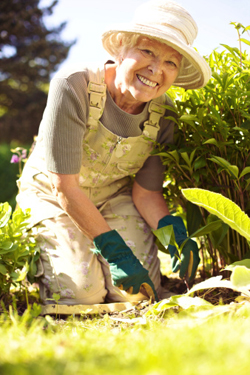 Gardening is an interest that can be enjoyed at all ages as it is generally considered a "low impact" activity. But, despite its reputation as a safe pursuit for young children and octogenarians alike, there are some concerns surrounding gardening as part of senior life activity. Here are a few tips to take to heart to minimize the risks and maximize the benefits of your gardening hours.
Gardening is an interest that can be enjoyed at all ages as it is generally considered a "low impact" activity. But, despite its reputation as a safe pursuit for young children and octogenarians alike, there are some concerns surrounding gardening as part of senior life activity. Here are a few tips to take to heart to minimize the risks and maximize the benefits of your gardening hours.
There’s More Than One Type of Gardening
There are plenty of options when it comes to exercising your green thumb—even if you don’t own land. Retirement communities and independent living complexes often have community gardens or small herb and vegetable plots for residents.
Nationwide, there are increasing efforts to locate accessible gardens in areas where seniors, children and gardeners with disabilities can gather to cultivate not only plants, but friendships.
Community vegetable gardens offer benefits for seniors who face social isolation and food insecurities as they age in place. Cooperative gardens, whether planned to provide visual stimulation or food, can also be a beneficial social link for those in assisted living communities or nursing homes. Some even offer horticultural classes and other continuing education opportunities.
Prevent Injury: Do It Right
If you’re going to get your hands dirty, make sure that you’re doing it right so that you aren’t doing your health more harm than good.
1. Dress for Outdoor Activity
If you're going to spend the day, or even just a part of it, in the garden, be sure to protect your skin.
- Wear a hat to shade your face and shield your eyes.
- Wear gloves to protect your hands from blisters.
- Wear proper shoes, not only for support, but to protect your toes as well!
Your skin plays a vital role in maintaining health and wellness, and the health of your skin is typically a reflection of your total wellness. So make sure you take the necessary steps to keep yourself protected!
2. Have the Proper Tools
Gardening, much like any other hobby, requires some specialized tools.
Long handled spades and tillers, turning forks, weed poppers, hand held pruners and trowels for transplanting, rakes and small shovels are all valuable assistants while you're gardening. Small clippers, a utility bucket, a watering can and a hose with a sprayer are also a necessity.
If you will be kneeling in the dirt, a foam pad or protective mat that you can use as a cushion can ensure that you’re as comfortable and supported as possible. If you're working on raised garden beds and have trouble standing for extended periods, bring your walker, a portable stool or mini-stepladder to offer a seating option.
Depending on the tasks you will tackle during any excursion into the garden, you can pick the appropriate tools to have with you.
3. Budget Your Time
As many will testify, time spent in the garden can be pleasant and rewarding. But it is also hard work and can be exhausting, giving mind as well as muscles a workout. So make sure to do some simple stretching exercises before and after a gardening session to prevent or relieve sore muscles.
As with any other activity, for seniors, moderation is the key to keeping it enjoyable. When gardening is a chore, smart seniors will seek outside help. If mowing the grass and trimming the trees become tasks best done by paid help (and younger people) seniors can still keep a hand in the landscaping by tending to flower beds or playing an active role in planning the seasonal planting.
Live Well, Be Well
In our Cincinnati community, one of the concepts we embrace is that of making senior life worth living— and living well. We realize that gardening plays a very beneficial role in the health and well-being of our community.
Landscaped grounds and walking paths provide beauty and a place for our residents with green thumbs to exercise their passion for gardening and "playing in the dirt." We encourage our Deupree House and Cottage residents to get out into the gardens as part of our person-centered care.
Health benefits of working in the out-of-doors go beyond the rejuvenating effects of fresh air and sunshine. Enjoying the beauty is good for people, as well, lifting spirits and contributing to mental and emotional health. Even simply spending time in a garden setting has been shown to reduce stress, aid concentration and benefit heart rate and blood pressure.












